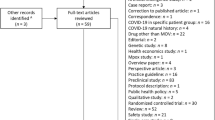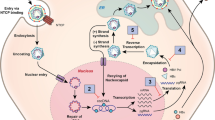Abstract
Background
In the UNITY-3 study, 96% sustained virologic response (SVR12) rate was observed in Japanese patients with hepatitis C virus (HCV) genotype (GT)-1 infection treated for 12 weeks with fixed-dose daclatasvir, asunaprevir, and beclabuvir (DCV-TRIO). As HCV clearance may improve liver outcomes, we assessed hepatic fibrosis and alpha-fetoprotein (AFP), a hepatocellular carcinoma risk marker, pre- and post-treatment in UNITY-3.
Methods
Treatment-naive or interferon-experienced UNITY-3 patients with HCV GT-1 who received twice-daily DCV-TRIO were assessed for fibrosis [FibroTest; FibroScan; fibrosis-4 index (FIB-4), aspartate-aminotransferase-to-platelet-ratio index] and AFP at baseline and Weeks 4 (FIB-4 only), 12 or 24 post-treatment.
Results
Of 217 patients, 99% had GT-1b infection, 46% were aged > 65 years, 21% had compensated cirrhosis, and 26% baseline HCV-RNA > 107 IU/mL. All GT-1b patients treated ≥ 4 weeks achieved SVR12 with (n = 54) or without (n = 144) baseline NS5A polymorphisms associated with DCV resistance (positions 28/30/31/93). Statistically significant post-treatment reductions from baseline were observed for all fibrosis measures and AFP, with numerically greater reductions in cirrhotic patients. FibroTest category improved in 44%, remained stable in 50%, and worsened in 6% of patients; 98% with baseline AFP < 6 μg/L remained < 6 μg/L and 51% with baseline AFP ≥ 6 μg/L were < 6 μg/L post-treatment.
Conclusions
DCV-TRIO administered for 12 weeks to Japanese patients with primarily GT-1b infection achieved a high SVR12 rate and resulted in improved measures of hepatic fibrosis and serum AFP that may reduce the risk of future liver disease progression and hepatocellular carcinoma, particularly in those with compensated cirrhosis.



Similar content being viewed by others

References
Carmona I, Cordero P, Ampuero J, et al. Role of assessing liver fibrosis in management of chronic hepatitis C virus infection. Clin Microbiol Infect. 2016;22(10):839–45.
American Association for the Study of Liver Diseases and the Infectious Diseases Society of America. Recommendations for testing, managing, and treating hepatitis C. http://www.hcvguidelines.org. 2016:[Accessed 09 May 2016].
Bruno S, Di Marco V, Iavarone M, et al. Survival of patients with HCV cirrhosis and sustained virologic response is similar to the general population. J Hepatol. 2016;64(6):1217–23.
Alter MJ. Epidemiology of hepatitis C virus infection. World J Gastroenterol. 2007;13(17):2436–41.
Raimondi S, Bruno S, Mondelli MU, et al. Hepatitis C virus genotype 1b as a risk factor for hepatocellular carcinoma development: a meta-analysis. J Hepatol. 2009;50(6):1142–54.
Rao H, Chen H, Shang J, et al. Real world clinical outcomes and disease progression of treatment-naive CHC patients in China: An interim analysis from the CCgenos study. 26th Conference of the Adian Pacific Association for the Study of the Liver (APASL). Shanghai, China. 2017;Abstract OP019.
Gao M, Nettles RE, Belema M, et al. Chemical genetics strategy identifies an HCV NS5A inhibitor with a potent clinical effect. Nature. 2010;465(7294):96–100.
McPhee F, Sheaffer AK, Friborg J, et al. Preclinical profile and characterization of the hepatitis C virus NS3 protease inhibitor asunaprevir (BMS-650032). Antimicrob Agents Chemother. 2012;56:5387–96.
Lemm JA, Liu M, Gentles RG, et al. Preclinical characterization of BMS-791325, an allosteric inhibitor of hepatitis C virus NS5B polymerase. Antimicrob Agents Chemother. 2014;58:3485–95.
Wei L, Zhang M, Xu M, et al. A phase 3, open-label study of daclatasvir plus asunaprevir in Asian patients with chronic hepatitis C virus genotype 1b infection who are ineligible for or intolerant to interferon alfa therapies with or without ribavirin. J Gastroenterol Hepatol. 2016;31:1860–7.
Manns M, Pol S, Jacobson IM, et al. All-oral daclatasvir plus asunaprevir for hepatitis C virus genotype 1b: a multinational, phase 3, multicohort study. Lancet. 2014;384(9954):1597–605.
Kumada H, Suzuki Y, Ikeda K, et al. Daclatasvir plus asunaprevir for chronic HCV genotype 1b infection. Hepatology. 2014;59(6):2083–91.
Kumada H, Suzuki F, Suzuki Y, et al. Randomized comparison of daclatasvir + asunaprevir versus telaprevir + peginterferon/ribavirin in Japanese hepatitis C virus patients. J Gastroenterol Hepatol. 2016;31(1):14–22.
McPhee F, Suzuki Y, Toyota J, et al. High sustained virologic response to daclatasvir plus asunaprevir in elderly and cirrhotic patients with hepatitis C virus genotype 1b without baseline NS5A polymorphisms. Adv Ther. 2015;32(7):637–49.
Sezaki H, Suzuki F, Hosaka T, et al. The efficacy and safety of dual oral therapy with daclatasvir and asunaprevir for genotype 1b in Japanese real-life settings. Liver Int. 2017;37(9):1325–33.
Akuta N, Sezaki H, Suzuki F, et al. Favorable efficacy of daclatasvir plus asunaprevir in treatment of elderly Japanese patients infected with HCV genotype 1b aged 70 and older. J Med Virol. 2017;89(1):91–8.
Muir AJ, Poordad F, Lalezari J, et al. Daclatasvir in combination with asunaprevir and beclabuvir for hepatitis C virus genotype 1 infection with compensated cirrhosis. JAMA. 2015;313:1736–44.
Poordad F, Sievert W, Mollison L, et al. Fixed-dose combination therapy with daclatasvir, asunaprevir, and beclabuvir for noncirrhotic patients with HCV genotype 1 infection. JAMA. 2015;313(17):1728–35.
Kao JH, Yu ML, Peng CY, et al. Daclatasvir/asunaprevir/beclabuvir (DCV-TRIO), all-oral, fixed-dose combination for patients with chronic HCV genotype 1. J Gastroenterol Hepatol. 2017;32(12):1998–2005.
Toyota J, Karino Y, Suzuki F, et al. Daclatasvir/asunaprevir/beclabuvir fixed-dose combination in Japanese patients with HCV genotype 1 infection. J Gastroenterol. 2017;52(3):385–95.
Miyaki E, Imamura M, Hiraga N, et al. Daclatasvir and asunaprevir treatment improves liver function parameters and reduces liver fibrosis markers in chronic hepatitis C patients. Hepatol Res. 2016;46(8):758–64.
Ishigami M, Hayashi K, Honda T, et al. Daclatasvir and asunaprevir treatment in patients with severe liver fibrosis by HCV genotype 1b infection: real world data. J Gastroenterol Hepatol. 2017;32:1879–86.
Asahina Y, Tsuchiya K, Nishimura T, et al. Alpha-fetoprotein levels after interferon therapy and risk of hepatocarcinogenesis in chronic hepatitis C. Hepatology. 2013;58(4):1253–62.
Eley T, Garimella T, Li W, Bertz RJ. Asunaprevir: a review of preclinical and clinical pharmacokinetics and drug-drug interactions. Clin Pharmacokinet. 2015;54(12):1205–22.
Ikeda K, Saitoh S, Kobayashi M, et al. Distinction between chronic hepatitis and liver cirrhosis in patients with hepatitis C virus infection. Practical discriminant function using common laboratory data. Hepatol Res. 2000;18(3):252–66.
McNemar Q. Note on the sampling error of the difference between correlated proportions or percentages. Psychometrika. 1947;12(2):153–7.
McPhee F, Hernandez D, Zhou N, et al. Virologic escape in HCV genotype 1-infected patients receiving daclatasvir plus ribavirin and peginterferon alfa-2a or alfa-2b. Antivir Ther. 2014;19:479–90.
Fridell RA, Wang C, Sun JH, et al. Genotypic and phenotypic analysis of variants resistant to HCV NS5A replication complex inhibitor BMS-790052: in vitro and in vivo correlations. Hepatology. 2011;54:1924–35.
McPhee F, Hernandez D, Zhou N, et al. Pooled analysis of HCV genotype 1 resistance-associated substitutions in NS5A, NS3 and NS5B pre- and post-treatment with 12 weeks of daclatavir, sunaprevir and beclabuvir. Antivir Ther. 2017. https://doi.org/10.3851/imp3182 (Epub ahead of print).
Backus LI, Belperio PS, Shahoumian TA, et al. Real-world effectiveness of ledipasvir/sofosbuvir in 4,365 treatment-naive, genotype 1 hepatitis C-infected patients. Hepatology. 2016;64(2):405–14.
Akuta N, Sezaki H, Suzuki F, et al. Retreatment efficacy and predictors of ledipasvir plus sofosbuvir to HCV genotype 1 in Japan. J Med Virol. 2017;89(2):284–90.
Fattovich G, Stroffolini T, Zagni I, et al. Hepatocellular carcinoma in cirrhosis: incidence and risk factors. Gastroenterology. 2004;127(5 Suppl 1):S35–50.
Takeuchi Y, Ikeda F, Osawa T, et al. Alpha-fetoprotein before and after pegylated interferon therapy for predicting hepatocellular carcinoma development. World J Hepatol. 2015;7(19):2220–8.
Dohmen K, Kawano A, Takahashi K, et al. The incidence and risk factors for the development of hepatocellular carcinoma after peginterferon plus ribavirin therapy for chronic hepatitis C. Hepatogastroenterology. 2013;60(128):2034–8.
Tada T, Kumada T, Toyoda H, et al. Post-treatment levels of alpha-fetoprotein predict long-term hepatocellular carcinoma development after sustained virological response in patients with hepatitis C. Hepatol Res. 2016;47:1021–31.
Nagaoki Y, Aikata H, Nakano N, et al. Development of hepatocellular carcinoma in patients with hepatitis C virus infection who achieved sustained virological response following interferon therapy: a large-scale, long-term cohort study. J Gastroenterol Hepatol. 2016;31(5):1009–15.
Nagata H, Nakagawa M, Asahina Y, et al. Effect of interferon-based and -free therapy on early occurrence and recurrence of hepatocellular carcinoma in chronic hepatitis C. J Hepatol. 2017;67:933–9.
Kobayashi M, Suzuki F, Fujiyama S, et al. Sustained virologic response by direct antiviral agents reduces the incidence of hepatocellular carcinoma in patients with HCV infection. J Med Virol. 2016;89:476–83.
Nahon P, Bourcier V, Layese R, et al. Eradication of hepatitis C virus infection in patients with cirrhosis reduces risk of liver and non-liver complications. Gastroenterology. 2017;152(1):142–56.e2.
Reddy KR, Pol S, Thuluvath PJ, et al. Long-term follow-up of patients with chronic HCV infection treated with daclatasvir-based regimens in phase 2 and 3 studies. Hepatology. 2016;64(suppl 1):434A–5A.
Ogasawara N, Kobayashi M, Akuta N, et al. Serial changes in liver stiffness and controlled attenuation parameter following direct-acting antiviral therapy against hepatitis C virus genotype 1b. J Med Virol. 2018;90(2):313–9.
Tamori A, Hai H, Uchida-Kobayashi S, et al. Outcomes for cirrhotic patients with hepatitis C virus 1b treated with asunaprevir and daclatasvir combination. Ann Hepatol. 2017;16(5):734–41.
Tada T, Kumada T, Toyoda H, et al. Improvement of liver stiffness in patients with hepatitis C virus infection who received direct-acting antiviral therapy and achieved sustained virological response. J Gastroenterol Hepatol. 2017;32(12):1982–8.
Acknowledgements
The authors thank Yue Zhao for her important statistical contributions to this study. UNITY-3 was a phase 3 study sponsored by Bristol-Myers Squibb. Editorial assistance with this manuscript was provided by Andrew Stead, PhD, of Articulate-Science LLC, Manchester, UK, and funded by Bristol-Myers Squibb.
Author information
Authors and Affiliations
Corresponding author
Ethics declarations
Conflict of interest
K Takaguchi has received speaker fees from Bristol-Myers Squibb K.K. AbbVie, and AstraZeneca K.K. A. Ido has received speaker fees from Bristol-Myers Squibb K.K. Gilead, and AbbVie; and commercial research funding from Eisai, EA Pharma, and Bristol-Myers Squibb K.K. Y. Karino has received speaker fees from Bristol-Myers Squibb K.K. MSD, AbbVie, Gilead, and Dainippon Sumitomo Pharma. K. Chayama has received speaker fees from MSD, Bristol-Myers Squibb K.K., and AbbVie. H. Watanabe and H. Ishikawa are employees of Bristol-Myers Squibb K.K. F. McPhee is an employee and holds stock in Bristol-Myers Squibb. S Noviello is an employee of Bristol-Myers Squibb; and holds stock in Bristol-Myers Squibb, Merck, and Johnson & Johnson. H. Kumada has received speaker fees from AbbVie, Gilead, Bristol-Myers Squibb K.K. MSD, and Dainippon Sumitomo Pharma. F. Ikeda, K. Tanaka, A. Naganuma, E. Tomita, S. Fujiyama, Y. Inada, N. Akuta, J. Toyota, and H. Yoshiji have no conflicts of interest to disclose.
Electronic supplementary material
Below is the link to the electronic supplementary material.
Rights and permissions
About this article
Cite this article
Akuta, N., Toyota, J., Karino, Y. et al. Potent viral suppression and improvements in alpha-fetoprotein and measures of fibrosis in Japanese patients receiving a daclatasvir/asunaprevir/beclabuvir fixed-dose combination for the treatment of HCV genotype-1 infection. J Gastroenterol 53, 1089–1097 (2018). https://doi.org/10.1007/s00535-018-1445-3
Received:
Accepted:
Published:
Issue Date:
DOI: https://doi.org/10.1007/s00535-018-1445-3



